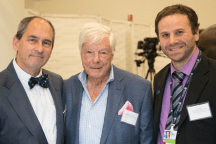“The Rappaports are funding people who are operating at the cutting edge,” said Bill Carlezon, Ph.D., who heads the Center of Excellence in Basic Neuroscience at McLean Hospital. “A lot of times there’s no precedent. They’re working on things that will appear in textbooks in the future.”
Dr. Carlezon has been on the committee to choose the Rappaport Fellows at McLean since 2005. It’s become one of the hospital’s most coveted and competitive awards, he said, based not only on the relatively substantial financial component, but on the flexibility it provides.
In contrast with a typical National Institutes of Health federal grant, he said, the Rappaport Award offers the opportunity for a young researcher to create his or her own dynamic path. In a field chronically short of training funds, NIH grants are often narrowly approved based on a predetermined potential for research success, “and that can work against people who are really innovative thinkers,” Dr. Carlezon said.
On the other hand, Rappaport Awards are more likely earned by those willing to play it less safe while on a path to greater future successes, championing research that dares to reexamine previous conceptions about the causes and treatment of psychiatric illness.
The Rappaport Fellowships also provide critical leverage, arming young awardees confidence and results to apply to government and private organizations for additional financial support toward a goal of becoming an independent investigator.
“It’s a means to NIH grants,” Dr. Carlezon said. “The researchers now have this pilot data, they’ve made their mistakes and they now know how to address them, and it was all made possible because of the money provided by the Rappaports.”
In addition to the research dollars, the Foundation offers substantial funding toward improving value in health care through the Rappaport Award in Clinical Innovation at Brigham and Women’s Hospital. The program was established in 2013 and provides support for internal medicine residents to spearhead innovative projects.
“We have a fantastic health care system in the United States, but it’s not affordable,” said Joel Katz, Ph.D., the Internal Medicine Residency Director and Vice Chair of Education at Brigham and Women’s, who has served on the selection committee since the program was founded. “If we can’t reduce the costs of health care or get more out of the health care dollar that we’re inputting, the weight of the expense is going to crush its impact.”
In the simplest terms, the Award in Clinical Innovation is designed to do just that: improve value by either increasing a system’s effectiveness or decreasing its cost.
The beauty of the program is that it rewards the very people who are least likely to have access to typical grants, who are at a particularly vulnerable period in their careers, and yet who know the most about waste in health care: the internal medicine residents.
Drs. Jose Figueroa and Bram Geller, for example, were the inaugural, 2013 recipients of the award for their project, “Educating and Incentivizing Housestaff on Early Discharges: An Intervention at Cost Containment.”
Recognizing that health care team goals and incentives were not always aligned, sometimes leading to delays in care and discharge, the Figueroa-Geller initiative worked to ensure that teams and their patients were co-localized to a single unit, not spread out throughout the hospital, thus improving care and teamwork while saving money.






